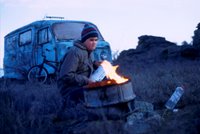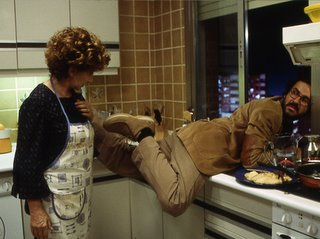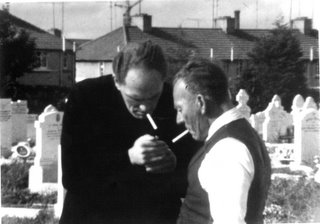Special Feature on Tuesday 21st February
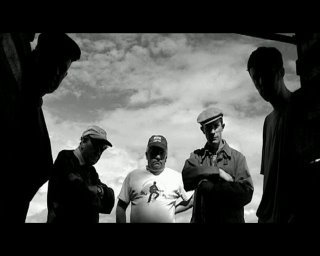
'TESTING TIME, TEDDY BOY' by Cavan Filmmaker Kevin McCann
The final hours have arrived for a struggling man and the bloodhound he has starved for one last race : The Ulster Drag-hunt. The two condemned, the heavens open to wash the scent of the dead fox from the race course, giving divine fortune to the underdog and his master.
"A Bleak moment in rural Ireland acted out by its people. Excellent."
Shane Connaughton, August 2005
"'Testing Time Teddy Boy' is terse, tough, and authentic. Shot in rich monochrome with a haunting soundtrack by Brendan Perry. It is well worth checking out."
Pat McCabe, August 2005
"I was struck by how well the piece was realised and by the sense of manace and rural desolation with which the director had imbued it ... the talking point at the Mid-Ulster Film Festival where it premiered."
Winner- Commendation at 7th Samhlíocht Kerry Film Festival 2005
Winner- Audience Award at 1st Navan Film Festival 2005
Official Selection - 2nd Mid-Ulster Film Festival 2005
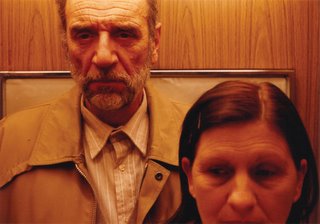
Dir: Juan-Pablo Rebella, Pablo Stroll
Cast: Andrés Pazos, Mirella Pascual, Jorge Bolani
Following 25 Watts, their successful debut feature about the lives of twentysomethings in Montevideo, directing duo Juan Pablo Rebella and Pablo Stoll turn their attention to an older generation in Whisky. Life at the sock factory is a monotonous routine for owner Jacobo Köller (Andrés Pazos), who shares a respectful - if distant - relationship with his employees, speaking for the most part only with his loyal assistant, Marta (Mirella Pascual). This lacklustre status quo is disturbed when Jacobo learns his younger brother Herman (Jorge Bolani), who feels guilty about missing their mother's funeral the year before, is arriving from Brazil for her gravestone-setting ceremony. This reunion so worries Jacobo that he asks Marta if she will pose as his wife during his brother's visit. Once Herman arrives, Jacobo is constantly on edge and he and Marta struggle to avoid giving conflicting information about their fictional history. But the three enjoy a surprisingly nice time together and soon Herman invites the "couple" on a weekend getaway that brings out unexpected elements of Marta's personality. Deriving most of its laughs from understatement rather than gags, Whisky is a very unconventional comedy reminiscent of the Kaurismäki brothers. The filmmaking is beautifully controlled and Rebella and Stoll are not afraid to set their own pace: we accompany Jacobo and Marta on three occasions as they open the factory before we learn Herman is coming to town. The performances by the leads are outstanding and the tenderness the directors have for their characters is apparent; through Marta's self-realisation, they show us it is never too late to change one's life. - Diana Sanchez, Toronto International Film Festival Both Juan Pablo Rebella and Pablo Stoll were born in Montevideo, Uruguay and started to work together while studying social communication at La Universidad Católica del Uruguay. Their feature debut, 25 Watts (co-directors, 01), won multiple awards including the VPRO Tiger Award at the International Film Festival Rotterdam. Whisky (co-directors, 04), their second feature, won the Prix du Regard Original at this year's Festival de Cannes.
“You really must see it.” - Sunday Times“A gem” - The Independent “Wryly comic” - Time Out“A terrific film...a real discover” - The Times
